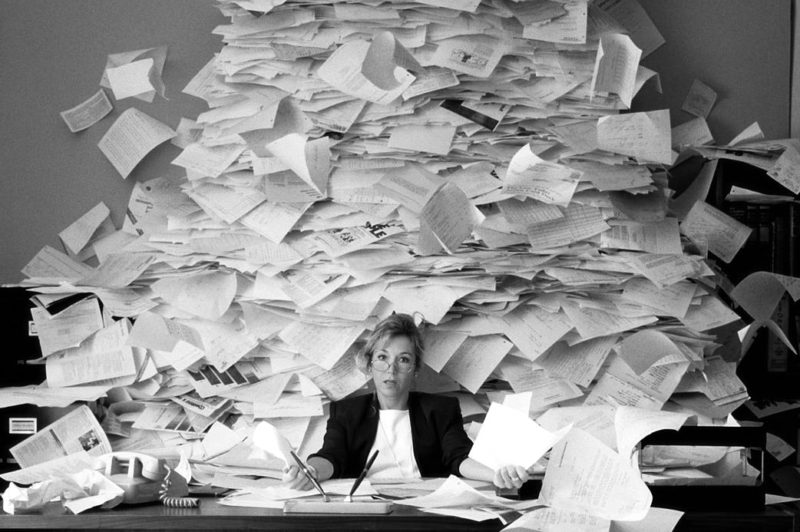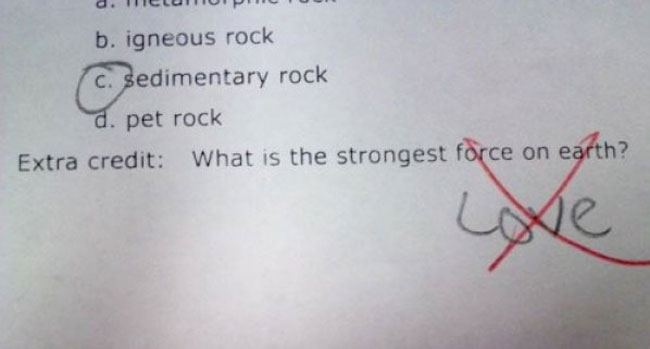Teachers do a lot of marking of student work. But is it necessary?

(source)
In this comprehensive review of the literature on feedback, corrective feedback (example shown below) without mechanisms for correcting that feedback were found, unsurprisingly, to have little impact on student learning in most cases.

An example of minimal feedback
Unfortunately, there is also good evidence (see the same literature review) that taking even more time to add comments to student work does not lead, by itself, to improved student learning. So what can teachers do differently?
"When you grade, you help one child at a time. When you plan, you help all kids. Spend your time accordingly." ~ @hpicciotto #NCTMregionals
— David Wees (@davidwees) October 28, 2016
Here’s a simple strategy. Take a pile of student work and review it, looking for evidence of student performance, and find examples of feedback that you can meaningfully target to groups of students, and then design activities for the whole class to do that result in different groups of students getting feedback on their ideas. In other words, integrate the time you would spend marking with the time you spend planning but in response to what students did in your class.
One question that comes up when I suggest this strategy to teachers is “But what will I put in my grade-book?” Here I suggest that a grade-book can contain evidence of completion of tasks on a regular basis and that for a smaller number of assignments, more detailed information could be provided. Stopping grading everything doesn’t mean you can’t grade anything; just be more selective. A more radical suggestion is to work at the school-wide level and eliminate everything that isn’t absolutely necessary to improve student learning.
Matt Engle says:
This is something I’ve spent a lot of time recently thinking about, and the results of that literature review don’t surprise me. I have never seen improved learning results based strictly on marking. In the last few years I’ve realized this and started trying to give helpful feedback in class or having students work in group on a task designed to address those specific things.
I am still trying to figure out how best to use my time with this. What’s the balance of time spent on this vs. moving on? I think that currently one of my roadblocks is finding the balance between introducing new concepts, giving practice in class, and formative assessment. Any insights based on what you’ve done?
November 28, 2016 — 4:46 am
David Wees says:
Matt, I have two suggestions.
1. If the current content is critical to understanding the next unit’s content, don’t move on until everyone gets it. Find ways of deepening knowledge in that area, perhaps by connecting ideas to other units (both past and future) but if you move on and the content is critical, some children will start the next unit behind.
2. Since there is significant evidence that we forget things over time if we don’t have opportunities to think about them again, repeatedly, at spaced intervals, spend at least some of your class time asking students to revisit ideas from previous units in the current unit. During these moments, you can give more specific feedback to students (or structure the activity presented to include this feedback) to students who may have thought differently the first time the ideas were presented or worked on.
November 28, 2016 — 12:56 pm
Matthew Engle says:
Thanks for the suggestions. One of my goals this school year has been to be more purposeful about revisiting past topics. I really like the idea of being intentional about actually connecting them to future units. I mean, I sort of try to do that with students in class during lessons, but I feel like a light bulb just went off to actually keep this idea in mind directly when designing an upcoming lesson. I’ll keep this stuff in mind.
I’m excited to work on building this stuff more into my curriculum. Your suggestions remind me of Henri Picciotto’s ideas, too.
December 5, 2016 — 12:45 am